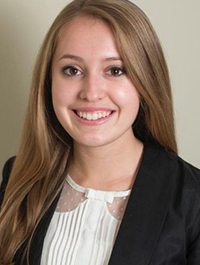
-
How did you know that Seton Hall was the right place for you to do your graduate work?
I was attracted to Seton Hall's Diplomacy and International Relations program because of the smaller class sizes, proximity to New York City, and its unique relationship with the United Nations. When I visited the campus before enrolling in the program, it was immediately apparent to me that the School of Diplomacy is a small, but tight knit community. I found this to be true throughout my time at the School, and it was a feature I definitely enjoyed. Coming from Appalachian State University, a big state school in North Carolina, I came to love the smaller class sizes and the chance to develop relationships that are more personal with my professors. One of my favorite discoveries about Seton Hall was the diversity of the program. Having the opportunity to experience a Kenyan perspective, an Iranian perspective, an American perspective and more all in one place is extremely valuable to me.
-
What were some of the highlights of your international experiences in Spain's Basque
Country and China? What existing skills were you able to apply in the field and what
new knowledge developed abroad were you able to apply in the classroom?
During my last semester in the program, I participated in the study abroad trip to the Basque Country. Although it was only a week, I learned a tremendous amount about the Basque people and the process of peacebuilding. One of my favorite moments was meeting with victims of the violence and as well as young university students. These discussions allowed us to have a better understanding of just how impactful the conflict was on the lives of so many Basque people, but also showed us how the new generation of Basque youth are dealing with their country's past. The conflict in the Basque Country is a unique case, but I was able to apply my new perspective on historical memory and post-conflict reconstruction to my other courses as well and draw parallels to other regions in conflict.
My time as an intern in China allowed me to explore Chinese work culture and how a Chinese think tank approaches research on Sino-U.S. relations. Through my courses at Seton Hall, I learned about Sino-U.S. relations through the lenses of Americans and other international students, but by interning at a think tank in China, I was able to better understand the Chinese perspective on the complex relationship. I was also able to apply cross-cultural communications skills I learned from my coursework for the global negotiation specialization during my time in China as I worked with a diverse team in the international consulting department.
-
You have worked with Diplomacy faculty members in a variety of capacities. What advice
do you have for students seeking opportunities to collaborate with professors outside
the classroom?
I would recommend that students engage as much as possible with their professors. Take the time to get to know the professor you are working with outside of your responsibilities; you could even invite them to lunch. Moments like these allow you to talk more informally about professional development and life advice.
-
What is the most important non-academic lesson you will take away from your experience
as a graduate student at the School of Diplomacy?
There are many answers I could give to this question, but one main thing I have learned is the importance of investing in those around you, whether that is your peers or your professors. I am very grateful for the wonderful friendships I have built here, and I have learned so much from conversations with my colleagues and professors outside of class. It is really important to utilize each other while you are here because it is a rare environment where you can talk about the Iranian election at lunch and North Korean nuclear proliferation over dinner.
Seton Hall Career Highlights
- Recipient of the U.S. State Department Critical Language Scholarship
- Oral English Teacher at Northeastern University in Shenyang China
- Senior Editor of the Journal of Diplomacy
- Basque Study Seminar Participant
- Intern at the Center for China and Globalization
- Research Assistant to Dr. Yanzhong Huang
